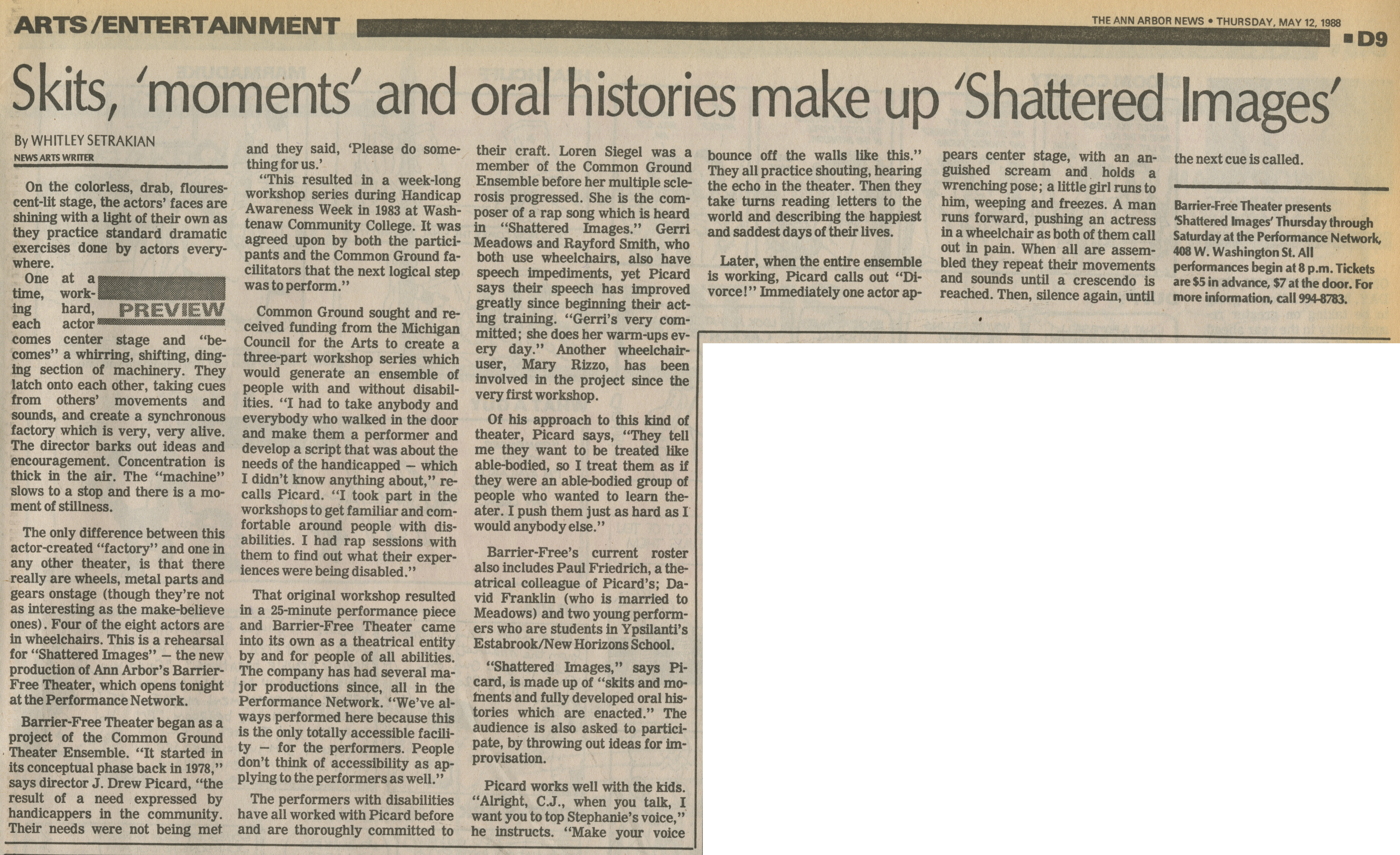Skits, 'moments' and oral histories make up 'Shattered Images'

ARTS /ENTERTAINMENT
THE ANN ARBOR NEWS THURSDAY, MAY 12, 1988
Skits, 'moments' and oral histories make up 'Shattered Images'
By WHITLEY SETRAKIAN
NEWS ARTS WRITER
PREVIEW
On the colorless, drab, flourescent-lit stage, the actors’ faces are shining with a light of their own as they practice standard dramatic exercises done by actors everywhere.
One at a time, working hard, each actor comes center stage and “becomes” a whirring, shifting, dinging section of machinery. They latch onto each other, taking cues from others’ movements and sounds, and create a synchronous factory which is very, very alive. The director barks out ideas and encouragement. Concentration is thick in the air. The “machine” slows to a stop and there is a moment of stillness.
The only difference between this actor-created “factory” and one in any other theater, is that there really are wheels, metal parts and gears onstage (though they’re not as interesting as the make-believe ones). Four of the eight actors are in wheelchairs. This is a rehearsal for “Shattered Images” — the new production of Ann Arbor’s Barrier-Free Theater, which opens tonight at the Performance Network.
Barrier-Free Theater began as a project of the Common Ground Theater Ensemble. “It started in its conceptual phase back in 1978,” says director J. Drew Picard, “the result of a need expressed by handicappers in the community. Their needs were not being met and they said, ‘Please do something for us.’
“This resulted in a week-long workshop series during Handicap Awareness Week in 1983 at Washtenaw Community College. It was agreed upon by both the participants and the Common Ground facilitators that the next logical step was to perform.”
Common Ground sought and received funding from the Michigan Council for the Arts to create a three-part workshop series which would generate an ensemble of people with and without disabilities. “I had to take anybody and everybody who walked in the door and make them a performer and develop a script that was about the needs of the handicapped - which I didn’t know anything about,” recalls Picard. “I took part in the workshops to get familiar and comfortable around people with disabilities. I had rap sessions with them to find out what their experiences were being disabled.”
That original workshop resulted in a 25-minute performance piece and Barrier-Free Theater came into its own as a theatrical entity by and for people of all abilities. The company has had several major productions since, all in the Performance Network. “We’ve always performed here because this is the only totally accessible facility - for the performers. People don’t think of accessibility as applying to the performers as well.”
The performers with disabilities have all worked with Picard before and are thoroughly committed to their craft. Loren Siegel was a member of the Common Ground Ensemble before her multiple sclerosis progressed. She is the composer of a rap song which is heard in “Shattered Images.” Gerri Meadows and Rayford Smith, who both use wheelchairs, also have speech impediments, yet Picard says their speech has improved greatly since beginning their acting training. “Gerri’s very committed; she does her warm-ups every day.” Another wheelchair-user, Mary Rizzo, has been involved in the project since the very first workshop.
Of his approach to this kind of theater, Picard says, “They tell me they want to be treated like able-bodied, so I treat them as if they were an able-bodied group of people who wanted to learn theater. I push them just as hard as I would anybody else.”
Barrier-Free’s current roster also includes Paul Friedrich, a theatrical colleague of Picard’s; David Franklin (who is married to Meadows) and two young performers who are students in Ypsilanti’s Estabrook/New Horizons School.
“Shattered Images,” says Picard, is made up of “skits and moments and fully developed oral histories which are enacted.” The audience is also asked to participate, by throwing out ideas for improvisation.
Picard works well with the kids. “Alright, C.J., when you talk, I want you to top Stephanie’s voice,” he instructs. “Make your voice bounce off the walls like this.” They all practice shouting, hearing the echo in the theater. Then they take turns reading letters to the world and describing the happiest and saddest days of their lives.
Later, when the entire ensemble is working, Picard calls out “Divorce!” Immediately one actor appears center stage, with an anguished scream and holds a wrenching pose; a little girl runs to him, weeping and freezes. A man runs forward, pushing an actress in a wheelchair as both of them call out in pain. When all are assembled they repeat their movements and sounds until a crescendo is reached. Then, silence again, until the next cue is called.
Barrier-Free Theater presents 'Shattered Images' Thursday through Saturday at the Performance Network, 408 W. Washington St. All performances begin at 8 p.m. Tickets are $5 in advance, $7 at the door. For more information, call 994-8783.